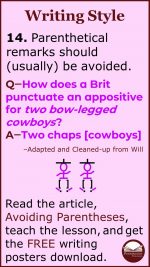Rhetorical Questions in Essays
“Mr. Smith says that I shouldn’t use thought-provoking questions in my thesis statements,” said Issa. “May I read you my thesis?”
“Sure. Let’s hear it,” responds Mandy.
“My thesis is ‘Do people really want to be successful and happy?’”
“Well, it is called a thesis statement, not a thesis question, ” Mandy replied. “Plus, doesn’t the answer appear in the question itself?”
“Oh, I get it. It’s one of those rhetorical questions,” says Issa.
“But, do you really get it?” asks Mandy.
“Ah… A rhetorical question. Very funny.”
“Apparently not so funny to Mr. Smith,” says Mandy.
Definition and Examples
A rhetorical question is a statement formed as a question. Rhetorical questions can be manipulative because they are designed to appear objective and open-ended, but may actually lead the reader to a foregone conclusion.
The rhetorical question takes several forms:
- It may answer itself and require no response. Example: Do people want to be successful?
- It may be used to provoke thought. Example: What if this generation could solve hunger?
- It may be used to state the obvious. Example: Can students try a bit harder next time?
- It may have no possible answer. Example: What if there is no answer to this problem?
Read the rules.
Don’t use rhetorical questions as thesis statements. Conclusion paragraphs may include rhetorical questions to provide questions for further study beyond the essay itself.
In the following sentences, [bracket] the rhetorical questions.
- How could they know? Why are the couples traveling to Europe for business?
- Without the tools the project was impossible to complete. Why bother? Does this project have a purpose?
- What is the message within that painting? What if all works of art meant something?
- If love is the answer, what is the question? Why do people fall in love? Does everyone do so?
- What happens when dreams are delayed? Can dreams be real? Or are dreams simply dreams?
Revise the rhetorical question into a statement.
Of what use are rhetorical questions?
Answers
- [How could they know?] Why are the couples traveling to Europe for business?
- Without the tools the project was impossible to complete. [Why bother?] [Does this project have a purpose?]
- What is the message within that painting? [What if all works of art meant something?]
- [If love is the answer, what is the question?] [Why do people fall in love?] [Does everyone do so?]
- [What happens when dreams are delayed?] [Can dreams be real?] [Or are dreams simply dreams?]
*****
For more essay rules and practice, check out the author’s TEACHING ESSAYS BUNDLE. This curriculum includes 42 essay strategy worksheets corresponding to teach the Common Core State Writing Standards, 8 on-demand writing fluencies, 8 writing process essays (4 argumentative and 4 informative/explanatory), 64 sentence revision and 64 rhetorical stance “openers,” writing posters, and helpful editing resources.
Differentiate your essay instruction in this comprehensive writing curriculum with remedial writing worksheets, including sentence structure, grammar, thesis statements, errors in reasoning, and transitions.
Plus, get an e-comment bank of 438 prescriptive writing responses with an link to insert into Microsoft Word® for easy e-grading (works great with Google Docs),
Download the following 24 FREE Writing Style Posters to help your students learn the essay rules. Each has a funny or ironic statement (akin to “Let’s eat Grandma) to teach the memorable rule.









